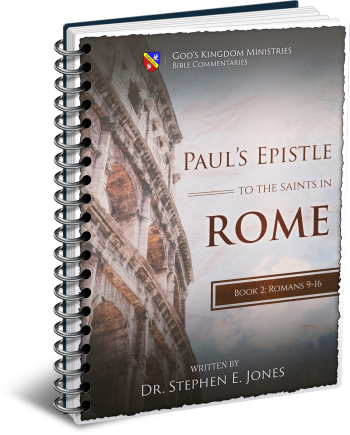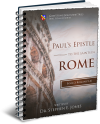Latest Posts
View the latest posts in an easy-to-read list format, with filtering options.

This is the completion of the two volume set of our study in the Book of Romans. This is Volume 2 which covers chapters 9 through 16 and the completion of the revelation of God's Love through Paul in His epistle to the Romans.
Category - Bible Commentaries

In Romans 11:28 Paul writes,
28 From the standpoint of the gospel they are enemies for your sake, but from the standpoint of God's choice they are beloved for the sake of the fathers; 29 for the gifts and the calling of God are irrevocable.
An enemy is one who opposes another. Paul uses the term, not merely to describe Jewish enmity against Christ, but in a broader sense as well. The House of Israel had proven to be enemies of Christ (Yahweh) as well. For this reason, they had become "not My people" and had been scattered by divine judgment.
The remnant of grace in Elijah's day were at enmity with the House of Israel, even as the remnant of grace in Paul's day were at enmity with the Jews of his day.
Yet in spite of this enmity, the mercy of God is such that He had a plan to save "all Israel." Paul says that this is "from the standpoint of God's choice," which was purely by grace. Recall that Rom. 9:11 says that "God's purpose according to His choice might stand, not because of works, but because of Him who calls."
Paul, then, appeals to God's sovereignty in this matter in order to let us know that He is dealing with the overall plan that had nothing to do with the will of man. Just as God had elected the remnant of grace by His own sovereign will, so also does He have a plan for His "enemies."
30 For just as you once were disobedient to God, but now have been shown mercy because of their disobedience, 31 so these also now have been disobedient, in order that because of the mercy shown to you, they also may now be shown mercy.
Paul insists that the blindness God imposed upon the vast majority of Israelites was ultimately for a good purpose. It was to bless the rest of the world, the ethnos. Since the days of Adam, the disobedience of the ethnos ultimately brought about the divine call to Abraham. God called one man and led him to a far country to begin training him for the divine mission of blessing all nations of the earth. So it was on account of the blindness and disobedience of the ethnos that Abraham (and Israel) received the call.
Later, when Israel as a nation fell into the same rebellion and lawlessness found in the rest of the nations, God scattered them into the world. Hosea's prophecy shows that God scattered them as if to sow seed in the world in order to obtain a great harvest.
In other words, by His sovereign will, God blinded Israel in order to bring judgment upon them—and that judgment was to scatter and sow Israel in the "field" (world). God did this to bless all of the families of the earth—the ethnos.
32 For God has shut up all in disobedience that He might show mercy to all.
He did not shut up all in disobedience at the same time, at least not in the context of Paul's writing. First God shut up the nations in disobedience, and later He shut up Israel in disobedience. Judah was the last to be blinded in this manner.
Paul was speaking in national terms about groups of people in a historical context. This does not negate the fact that all men have been blinded as individuals since Adam. It is just that Paul was focusing primarily on the national application of this principle of blindness by the sovereign hand of God.
Keep in mind also that were it not for God's ultimate plan to save all mankind, this would be terribly unjust. It is only when people do not understand the plan to save all mankind that they cannot comprehend the sovereignty of God. Apart from the salvation of all men, the sovereignty of God cannot be reconciled with His justice and love.
Paul then can no longer contain His excitement and awe at the majesty and scope of the divine plan. He was obviously very impressed with the mind of God, His sovereignty, wisdom, knowledge, justice, and mercy. Even the disobedience of Israel, Judah, and all of humanity had a divine purpose in His plan. Nothing took God by surprise, and God's original intent for mankind could never be thwarted, for God was indeed sovereign, and His will shall always be accomplished—even when it appeared that all was lost.
33 Oh, the depth of the riches both of the wisdom and knowledge of God! How unsearchable are His judgments and unfathomable His ways!
Paul here refers to various Scriptures without directly quoting any of them. Perhaps the key Scripture is from Job 41:11,
11 Who has given to Me that I should repay Him? Whatever is under the whole heaven is Mine.
The story of Job, as everyone knows, is the story of how God gave permission to Satan to afflict him (Job 1:12). The entire book is about the purpose of evil and how God allowed Job to be afflicted for a good purpose as revealed in the end of the story. It is a story of God's sovereignty and how He appears to use that power to inflict evil upon men, but in the end we discover that God's intent was for good.
This is the same principle by which God has blinded all mankind. It is to bring mercy upon all in the end. God will not allow His temporary injustices to stand forever. He will always bring restoration, if not in this life, then certainly in the next. In the end, all things will work together for good (Rom. 8:28).
36 For from Him and through Him and to Him are all things. To Him be the glory forever. Amen.
All things, whether they be physical or not, come from (ek, "out of") Him. This has to do with the origin of the building material by which God created the heavens and the earth. Theologians have used three Latin terms to describe differing views:
creatio ex nihilo, "creation out of nothing"
creatio ex materia, "creation out of some pre-existent, eternal matter"
creation ex deo, "creation out of the being of God"
In the first century, Paul says that all things came out of God, which is the third view (above). The second-century Church fathers began to teach that God created all things out of nothing, based on 2 Maccabees 7:28, written over a century before Christ:
"I beseech thee, my son, look upon the heaven and the earth, and all that is therein, and consider that God made them of things that were not; and so was mankind made likewise."
The ex materia view was the Greek classical view that matter was eternal and chaotic before being formed and organized. They also believed that the devil ("demiurge") was the creator, because they believed that matter was inherently evil, and only spirit was good. So the normal Greek view in Paul's day was the second (above). This view today is perpetuated by the Mormons, who took issue with the ex nihilo view and began to teach the ex materia view of creation.
Paul's view was that all things came out of God Himself. His statement in Heb. 11:3 "that what is seen was not made out of things which are visible" is quite different from 2 Maccabees, for Paul only says that matter is made out of things invisible, or too small to be seen with the naked eye (i.e., atoms, electrons, neutrons, protons). He does NOT say that God created these things out of nothing (ex nihilo), as does the writer of 2 Maccabees.
Paul tells us that because all things came out of God, all things must inevitably return to Him. This is his way of expressing the divine plan. The smallest pieces of matter are not atoms or protons or even quarks. They are called by physicists "God Particles," and (like light) can act as either a particle or a wave. They are the point of transition from spirit to matter.
All things go THROUGH Him as well. This is what we call history. It is the outworking of the divine plan, and it includes the imposition of blindness upon humanity.
Finally, all things go back TO Him in the restoration of all things. If any "God Particle" is left unrestored, if any part of God is cut off from Him forever, then God will forever remain incomplete and imperfect. All must truly go back TO Him in order for all things to work together for good, and for the divine plan to be complete.
Only in such an event could Paul conclude with his doxology, "To Him be the glory forever. Amen."